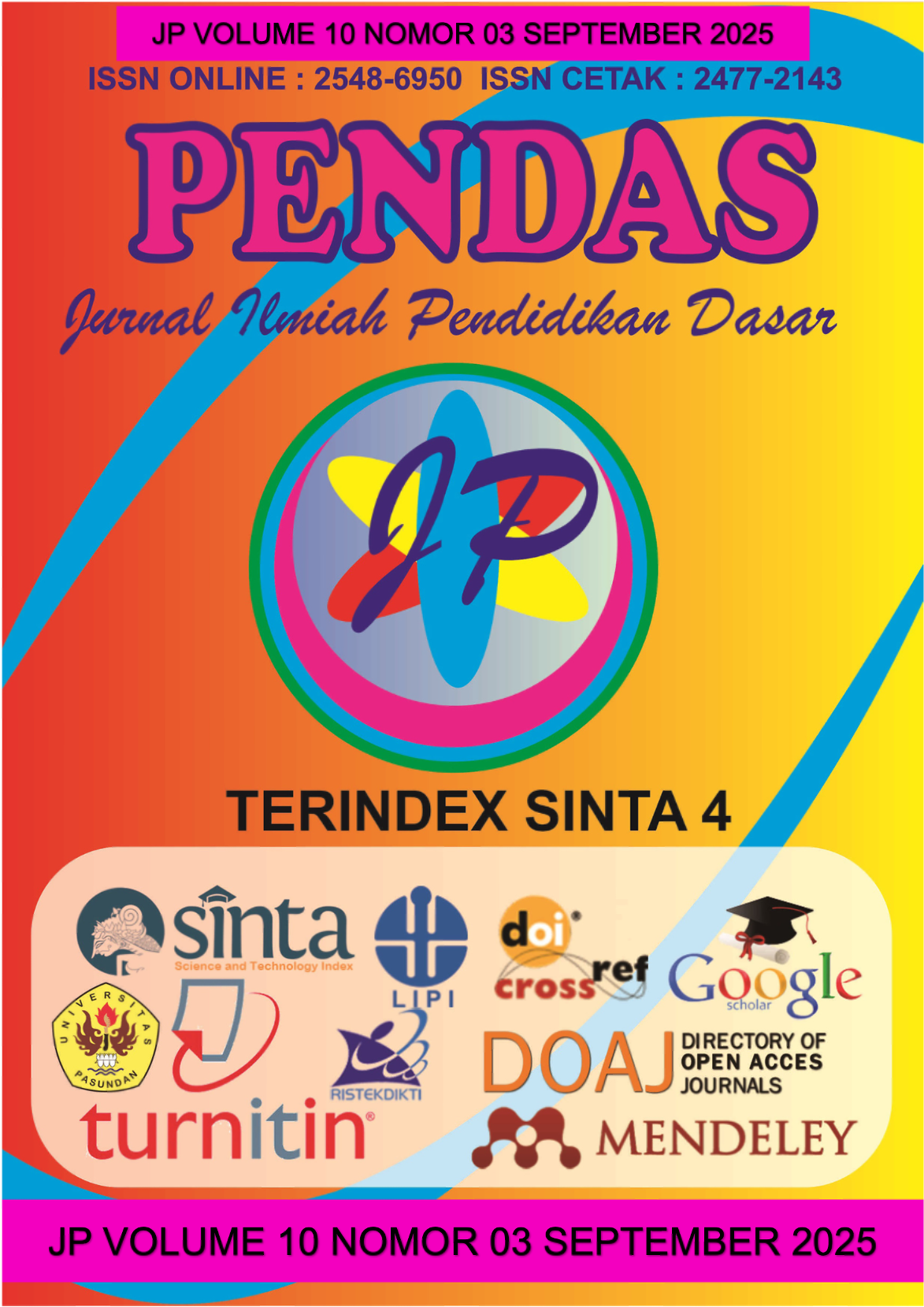ANALISIS PEMANFAATAN ARTIFICIAL INTELLIGENCE (AI) OLEH GURU DALAM PEMBELAJARAN BAHASA INDONESIA DI MTS NEGERI 1 JENEPONTO
-
DOI:
https://doi.org/10.23969/jp.v10i03.32524Keywords:
Analisis, Artificial Intelligence, ChatGPT, Gemini, CanvaAbstract
The main problem raised in this study is how to use artificial intelligence (AI) in Indonesian learning by teachers at MTs Negeri 1 Jeneponto?. The purpose of this research is to describe the use of artificial intelligence (AI) in Indonesian learning by teachers at MTs Negeri 1 Jeneponto. The type of research used is qualitative research designed using qualitative descriptive methods. This qualitative descriptive method is used to describe a phenomenon about the use of AI in Indonesian language learning with data collection techniques, namely direct interviews, direct observations, and documentation. The data that has been collected is analyzed with steps, namely reducing the data that has been collected, then drawing conclusions and interpretation, and triangulating to ensure that the data that has been analyzed and interpreted is in accordance with the needs of the research. Based on the results of this study, it can be concluded that the use of AI has been actively implemented by teachers, especially through platforms such as ChatGPT, Gemini, Canva, and Google Classroom. Teachers use AI in various aspects of learning, ranging from the preparation of teaching modules, the creation of evaluation questions, to digital classroom management. This utilization has been proven to provide significant benefits, such as efficiency of working time, increased teacher creativity, ease of access to learning resources, and increased student participation and interest in learning. The students' response to the use of AI was also quite positive, as seen from their enthusiasm during the learning process.
Downloads
References
Andika, A., & Subroto, A. 2020. Pemanfaatan Kecerdasan Buatan dalam Pembelajaran Bahasa Indonesia. Jurnal Teknologi Pendidikan Indonesia, 5(2), 102-118. https://doi.org/10.1234/jtpi.2020.05.02
Bandura, A. 2018. The Social Learning Theory in the Ddigital Age. Journal of Educational Psychology, 110(2), 320-335. https://doi.org/ 10.1037/ edu0000220
Davis, A., & Park, S. 2021. The Role of AI in Automated Grading Systems: Improving Efficiency and Objectivity. Journal of Educational Technology, 43(1), 45-61. https://doi.org/10.1016/j.jeduc.2020.10.001.
Hernandez, T. 2022. AI For Teacher Facilitation: Personalized Learning Support in Classrooms. International Journal of Educational Research, 48(3), 234-250. https://doi.org/10.1016/j.ijer.2021.12.003.
Kusnadi, D. 2021. Pembelajaran Berbasis Teknologi dan Peran Guru dalam Kurikulum Merdeka. Jurnal Pendidikan Indonesia, 36(1), 85-98. https://doi.org/10.23887/jpi.v36i1.3013
Lee, K. 2022. Adaptive Learning Systems for Language Education: Enhancing Learning Outcomes Qith AI. Journal of Language Teaching and Learning, 52(2), 155-170. https://doi.org/10.1016/j.ltl.2022.02.004
Piaget, J. (976. The Child and Reality: Problems of Genetic Psychology. Viking Press.
Prasetyo, D., & Salim, M. 2022. Efektivitas Ssistem Penilaian Otomatis Berbasis AI dalam Pendidikan Bahasa Indonesia. Jurnal Teknologi Pendidikan, 20(4), 400-415. https://doi.org/10.1016/j.jtp.2022.04.003
Russell, S., & Norvig, P. 2020. Artificial Intelligence: A Modern Approach (4th ed.). Pearson Education.
Setiawan, B. 2021. Pengaruh Pembelajaran Adaptif Berbasis AI terhadap Hasil Belajar Bahasa Indonesia. Jurnal Pendidikan dan Teknologi, 19(3), 205-220. https://doi.org/10.1093/jpt.2021.12.012
Smith, J., & Johnson, R. 2020. AI in Education: Enhancing Learning With Technology. International Journal of Educational Innovation, 25(2), 100-115. https://doi.org/10.1016/j.ijed.2020.07.006
Vygotsky, L. 1978. Mind in Ssociety: The Development of Higher Psychological Processes. Harvard University Press.
Wijaya, A., & Yuniar, R. 2021. Penerapan AI untuk Mendukung Pembelajaran Mandiri dalam Bahasa Indonesia. Jurnal Pendidikan dan Teknologi, 13(3), 210-225. https://doi.org/10.1080/jpt.2021.12.007
Yuliana, L., & Putra, A. 2020. Integrasi Kecerdasan Buatan dalam Pembelajaran Bahasa: Analisis Penerapan Teknologi di Sekolah Menengah Pertama. Jurnal Pendidikan Teknologi, 10(1), 45-60. https://doi.org/10.23887/jpt.2020.10.01
Sari, N. 2020. Peran Teknologi dalam Meningkatkan Keterampilan Berbahasa Siswa dengan Kecerdasan Buatan. Jurnal Pendidikan Bahasa, 18(2), 123-137. https://doi.org/10.1021/jpb.2020.18.02
Pramesti, T., & Irwanto, W. 2021. Penggunaan AI dalam Pembelajaran Berbasis Pproyek di Sekolah Menengah Atas. Jurnal Teknologi Pendidikan, 22(4), 250-263. https://doi.org/10.1016/j.jtp.2021.06.014
Azizah, R., & Arifin, M. 2020. Evaluasi Pemanfaatan Sistem Penilaian Otomatis dalam Pembelajaran Bahasa Indonesia. Jurnal Pendidikan dan Evaluasi, 11(3), 50-61. https://doi.org/10.23887/jpe.2020.11.03
Hidayat, D. 2022. AI untuk Pembelajaran Berbasis Analitik Data: Aplikasi di Sekolah Menengah Pertama. Jurnal Teknologi Pendidikan, 19(2), 90-106. https://doi.org/10.1093/jtp.2022.19.02
Yuliana, S. 2022. Pemanfaatan Chatbot sebagai Media Pembelajaran Bahasa dalam Meningkatkan Kemampuan Berbicara Siswa. Jurnal Pengajaran Bahasa, 20(1), 70-83. https://doi.org/10.1016/j.jpb.2022.01.009
Fauzi, A., & Arbi, S. 2021. Penerapan AI dalam Pembelajaran Bahasa Indonesia: Studi kasus di Sekolah Menengah. Jurnal Inovasi Pendidikan, 14(3), 135-148. https://doi.org/10.1080/jip.2021.14.03
Safitri, F., & Wahyudi, M. 2020. Kecerdasan Buatan dalam Pendidikan Bahasa: Pembelajaran Adaptif untuk Siswa dengan Kebutuhan Khusus. Jurnal Pendidikan Inklusif, 8(2), 92-107. https://doi.org/10.23887/jpi.2020.08.02
Downloads
Published
Issue
Section
License
Copyright (c) 2025 Pendas : Jurnal Ilmiah Pendidikan Dasar

This work is licensed under a Creative Commons Attribution 4.0 International License.














































